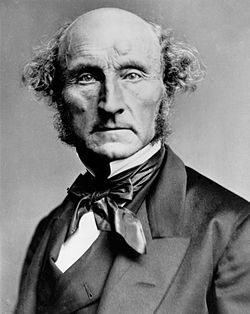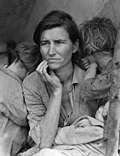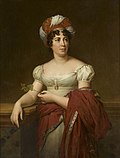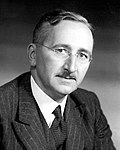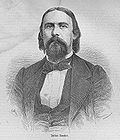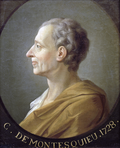
Back بوابة:ليبرالية Arabic Portal:Liberalizm Azerbaijani Πύλη:Φιλελευθερισμός Greek Portail:Libéralisme French Портал:Либерализм Russian ද්වාරය:ලිබරල්වාදය Singhalese Portal:Liberalizm Turkish Portal:自由主义 Chinese
The Liberalism portal
Liberalism is a political and moral philosophy based on the rights of the individual, liberty, consent of the governed, political equality, the right to private property, and equality before the law. Liberals espouse various and often mutually conflicting views depending on their understanding of these principles but generally support private property, market economies, individual rights (including civil rights and human rights), liberal democracy, secularism, rule of law, economic and political freedom, freedom of speech, freedom of the press, freedom of assembly, and freedom of religion. Liberalism is frequently cited as the dominant ideology of modern history.
Liberalism became a distinct movement in the Age of Enlightenment, gaining popularity among Western philosophers and economists. Liberalism sought to replace the norms of hereditary privilege, state religion, absolute monarchy, the divine right of kings and traditional conservatism with representative democracy, rule of law, and equality under the law. Liberals also ended mercantilist policies, royal monopolies, and other trade barriers, instead promoting free trade and marketization. The philosopher John Locke is often credited with founding liberalism as a distinct tradition based on the social contract, arguing that each man has a natural right to life, liberty and property, and governments must not violate these rights. While the British liberal tradition emphasized expanding democracy, French liberalism emphasized rejecting authoritarianism and is linked to nation-building. (Full article...)
Selected article -
The National Liberal Party–Brătianu (Romanian: Partidul Național Liberal-Brătianu, PNL; also known as Georgiști - "Georgists", from the name of their leader, Gheorghe I. Brătianu) was a right-wing political party in Romania, formed as a splinter group from the main liberal faction, the national liberals. For its symbol, PNL-Brătianu chose three vertical bars, placed at equal distance from each other. The Georgists' official voice was Mișcarea, a journal that supported an eponymous publishing house; notably, Mișcarea published art chronicles contributed by the writer Tudor Arghezi.
The National Liberal Party–Brătianu was active between June 15, 1930 and January 10, 1938. Notable members of the group, other than its founder Brătianu, included the historians Ștefan Ciobanu, Constantin C. Giurescu, Scarlat Lambrino, Constantin S. Nicolăescu-Plopşor, Petre P. Panaitescu, Victor Papacostea, and Aurelian Sacerdoţeanu, the geographer Simion Mehedinți, the novelist Mihail Sadoveanu, the actor and poet Mihail Codreanu, the linguist Alexandru Rosetti, the jurist Paul Negulescu, the Romanian Army general Artur Văitoianu, and the lawyer Mihai Antonescu; it was primarily intellectual in appeal, and was especially involved in recruiting members of social and cultural elites, whom it placed at the top of its political hierarchy. (Full article...)
Selected biography -
John Stuart Mill (20 May 1806 – 7 May 1873) was an English philosopher, political economist, politician and civil servant. One of the most influential thinkers in the history of liberalism, he contributed widely to social theory, political theory, and political economy. Dubbed "the most influential English-speaking philosopher of the nineteenth century" by the Stanford Encyclopedia of Philosophy, he conceived of liberty as justifying the freedom of the individual in opposition to unlimited state and social control. He advocated political and social reforms such as proportional representation, the emancipation of women, and the development of labour organisations and farm cooperatives. The Columbia Encyclopedia describes Mill as occasionally coming "close to socialism, a theory repugnant to his predecessors." He was a proponent of utilitarianism, an ethical theory developed by his predecessor Jeremy Bentham. He contributed to the investigation of scientific methodology, though his knowledge of the topic was based on the writings of others, notably William Whewell, John Herschel, and Auguste Comte, and research carried out for Mill by Alexander Bain. He engaged in written debate with Whewell.
A member of the Liberal Party and author of the early feminist work The Subjection of Women, Mill was also the second Member of Parliament to call for women's suffrage after Henry Hunt in 1832. (Full article...)
List of selected biographies
|
|---|
Selected quote
General images
Subcategories
Related portals
WikiProjects
Topics
Recognized content
Associated Wikimedia
The following Wikimedia Foundation sister projects provide more on this subject:
-
Commons
Free media repository -
Wikibooks
Free textbooks and manuals -
Wikidata
Free knowledge base -
Wikinews
Free-content news -
Wikiquote
Collection of quotations -
Wikisource
Free-content library -
Wikiversity
Free learning tools -
Wiktionary
Dictionary and thesaurus
© MMXXIII Rich X Search. We shall prevail. All rights reserved. Rich X Search
